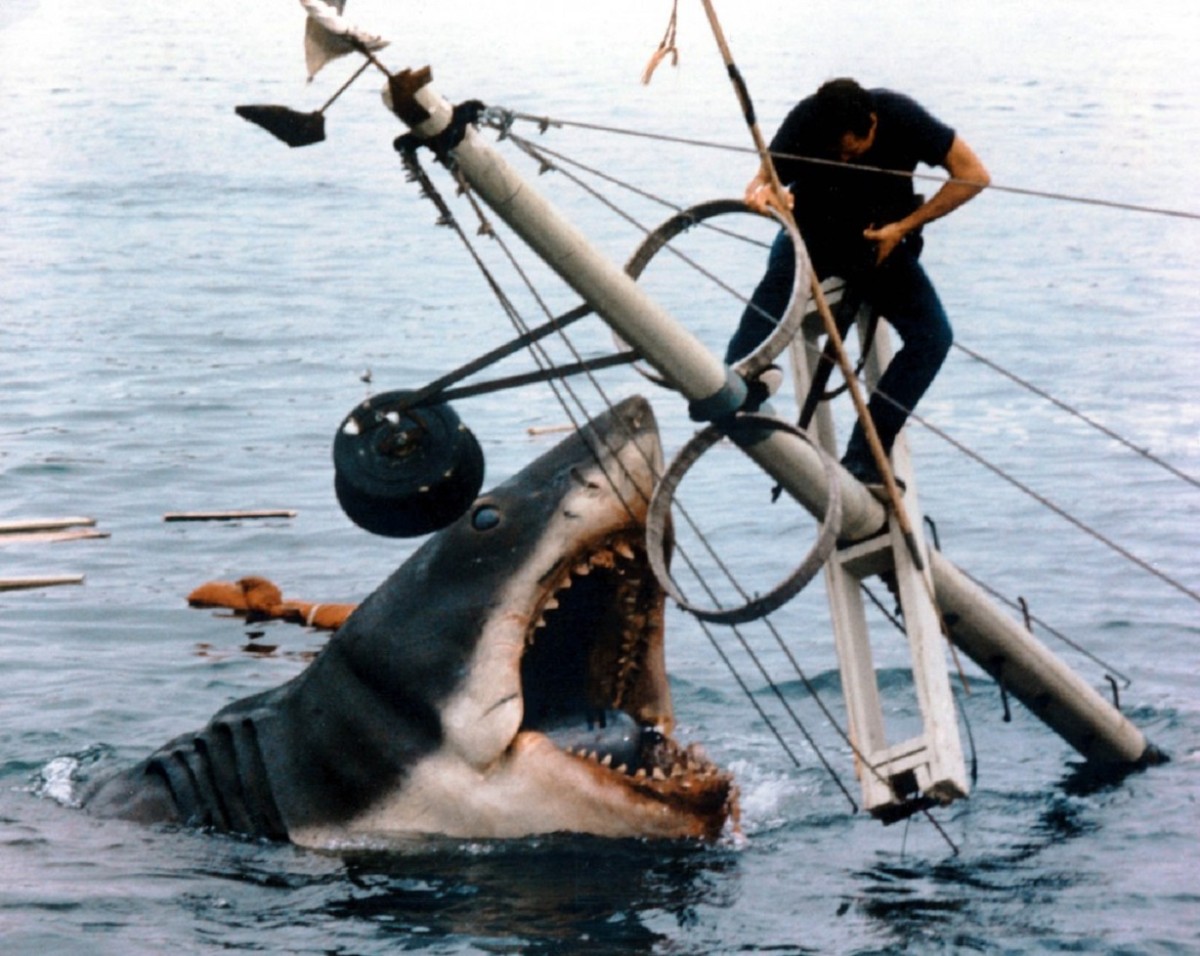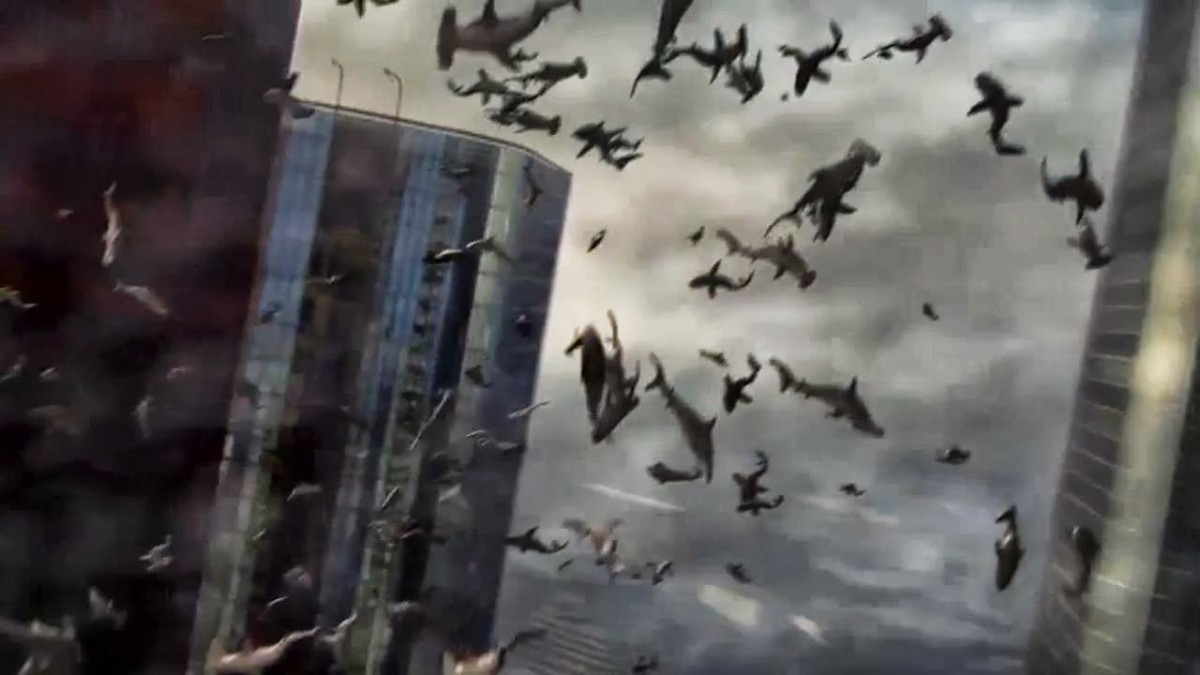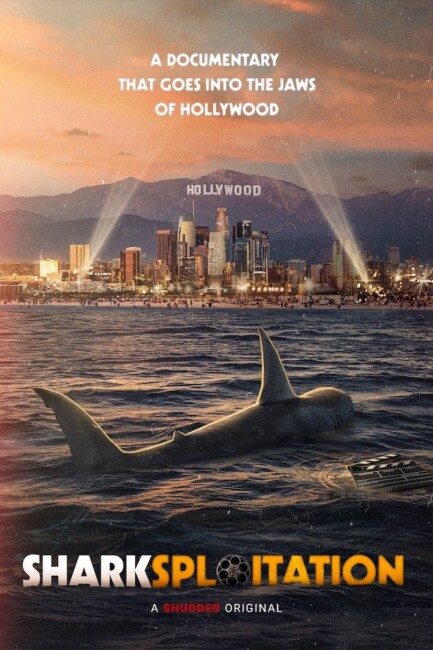USA. 2023.
Crew
Director/Screenplay – Stephen Scarlata, Producers – Josh Miller & Kerry Deignan Roy, Photography – Jim Kunz, Music – Ceiri Torjussen. Production Company – Shudder/Sharksploitation, LLC.
With
Joe Alves, Mark Atkins, Paul Bales, Wendy Benchley, Jim Bertges, Christian Bogh, Glenn Campbell, Tom Chapin, Roger Corman, Joe Dante, Scott Devine, Anthony C. Ferrante, Michael Gingold, Carl Gottlieb, Chris Kentis, A. Peter Klimley, David Michael Latt, Matthew P. Mercer, Dr Rebekah McKendy, Vanessa Morgan, James Nunn, Mark Polonia, Christopher Ray, Adam Rifkin, David Rimawi, Johannes Roberts, Rob Schrab, Dr David Shiffman, Matty Simmons, Dr Gregory Stone, Misty Talley, Andrew Traucki, Mario Van Peebles, Vicki Vasquez, Thomas P. Vitale, Scott Wheeler, David Worth, Dr Emily Zarka
Sharksploitation is a Documentary devoted to the killer shark film made for the Shudder network. The shark film started with the massive success of Steven Spielberg’s Jaws (1975). This led to a body of sequels and copycats throughout the 1980s and 90s. By the 2010s, this had morphed into the Gonzo Killer Shark film as typified by Sharknado (2013) and a whole body of shark films that seem to be in a competition to be more absurd than the next. (For a more detailed listing see Killer Shark Films).
I was majorly impressed with Sharksploitation’s efforts to get to the heart of the shark films and trace its origins. It takes it right back to the earliest depictions of sharks on film in the likes of The Sea Bat (1930), Tabu: A Story of the South Seas (1931), Tiger Shark (1932), Omoo-Omoo the Shark God (1949) and She Gods of Shark Reef (1958), where it is noted that shark depictions here are positive rather than monstrous and threatening. And from there the move to adventure-styled films that use real sharks with Underwater! (1955), Shark! (1969) and Blue Water White Death (1971).
The film even covers the shark as employed by super-villains in films like Thunderball (1965), Live and Let Die (1973), Licence to Kill (1989), The Phantom (1996), Austin Powers in Goldmember (2002) and Despicable Me (2010). We take in the shark deity of Moana (2016) and the shark-human hybrid of The Suicide Squad (2021), while there is even mention of the bat shark repellent gag in Batman (1966).

Sharksploitation is an impressively in-depth examination that not only traces the history of cinematic sharks but goes back to look at the way sharks are depicted in mythology. There is an effort made to trace the source of the historical fear of sharks to the mass panic that spread in newspapers following a swimmer being attack on the Jersey Shore in 1916, as well as to the USS Indianapolis incident in 1945.
We then move to the game changer that was Jaws. The film gets interviewers with original novelist Peter Benchley’s widow Wendy, along with the film’s screenwriter Carl Gottlieb and production designer Joe Alves. There is also discussion of Jaws 2 (1978), a reasonable amount of time spent on Jaws 3-D (1983) with Alves and others on the difficulty of presenting a shark in 3D and how much of a letdown the 3D ended up being, and some defence of Jaws: The Revenge (1987). Joe Dante speaks about the touted parody Jaws 3, People 0, for which he was hired as director on the basis of Piranha (1978), and how it ended up being killed off due to a tug of war between National Lampoon, who wanted to make it an R-rated film, and producers Zanuck-Brown, who aimed for mass appeal.
Sharksploitation then moves on to discuss the various Jaws copies including Mako: Jaws of Death (1976), the tv movie Shark Kill (1976) and Tintorera (1977), as well as spending some time on The Last Shark/Great White (1981), which was withdrawn from distribution due to a copyright lawsuit from Universal for ripping off Jaws. It also touches on the copycats featuring other animals such as Grizzly (1976), Orca (1977), Tentacles (1977), Piranha and Alligator (1980), with the case even being made for The Car (1977) being Jaws on dry land. Not to mention coverage of tv series of the era that offered up shark episodes including The Six Million Dollar Man (1973-8), The Bionic Woman (1976-8), The Hardy Boys/Nancy Drew Mysteries (1977-9), Rescue from Gilligan’s Island (1978), The Misadventures of Sheriff Lobo (1979-91), Matt Houston (1982-5), even a Saturday Night Live (1975- ) spoof skit and the infamous Happy Days (1974-84) episode that led to the phrase “Jump the Shark” referring to a point where a series starts to lose its creativity. And then of Jaws spoofs and in-jokes in films like Airplane (1980), Caddyshack (1980), Police Academy 5: Assignment: Miami Beach (1988), A Nightmare on Elm Street IV: The Dream Master (1988) and Clerks. (1994).

Rebekah McKendry offers an appealing breakdown of the formula of shark movies – the mayor who refuses to shut the beaches down; the need to consult a scientist with expertise on sharks; the refusal by the authorities to believe something is out there until deaths pile up; and the hero going out alone to take on the shark. Discussed also are absurdities like the idea of sharks that roar. Scientists talk about the notion of the prehistoric megalodon that has crept in to the public consciousness thanks to B movies and in particular the Discovery Channel mockumentary Megalodon: The Monster Shark Lives (2013) and how every lecture they give has a member of the audience invariably asking about the modern existence of megalodons. It is even discussed how Richard Dreyfuss’s scientist in Jaws, clad in jeans, was so much a bucking of the cliché of the scientist in a lab coat that it inspired some of the scientists interviewed.
The Jaws ripoffs that were released to video/dvd in the 1990s/2000s are skipped over relatively quickly, although many of them do appear in clip montage. Among these, the film does stop to pay tribute to blatant Italian ripoff Cruel Jaws (1995) and its rehash of footage from other films, the Bollywood version Aatank (1996) where people sing as they are eaten, and the legendary badness of Shark Attack 3: Megalodon (2001). There is surprising respect given for Renny Harlin’s Deep Blue Sea (1999), which is seen as the start of the deliberately ridiculous shark film.
There is coverage of the entire Sharkando phenomenon, although less on the tidal wave of the other deliberately ridiculous shark films that has come out since then. However, there are interviews with quite number of names that I have to type up with regularity – Mark Atkins, Glenn Campbell, Anthony C. Ferrante, David Michael Latt, Mark Polonia, Christopher Ray, Misty Talley and Scott Wheeler – and it is interesting to put faces to the people behind the camera.

There is an illuminating interview with Thomas P. Vitale, the former Executive Vice President of Programming at the Syfy Channel. Much of the deliberately ridiculous shark film can be laid at his door. He talks of their development of low-budget films for programming and how they started to escalate phenomena by combining monsters in various ‘vs’ titled films. Misty Talley speaks of how they are often given a title and then have to go away and come up with a film to go with it. The film’s most amusing line is from The Asylum’s producer David Michael Latt referring to their output of product: “We’re just there as any good drug dealer would be to supply them with drugs”.
Sharksploitation also deals with the genre of survival in shark infested waters that grew following the success of Open Water (2003), which is discussed in some detail by director Chris Kentis, along with 47 Meters Down (2017), featuring interviews with director Johannes Roberts and assistant director James Nunn. One of the most interesting sections comes towards the end in the interview with Wendy Benchley and how she talks of how Peter Benchley deeply regretted that he had transformed the shark into a monster and how he, up until his death in 2006, devoted his time to shark conservation.
Trailer here


